

Ethiopia: Dairy, Meat Exports Surge. Ethiopia nets $72 million from meat exports to UAE, Saudi Arabia. 211 Million USD for Ethiopia in 5 Months from Oilseeds and Pulses. Ethiopia Soil Map Arms Farmers With New Fertilisers in Climate Fight. By Pius Sawa Addis Ababa — Nationwide survey of soil conditions is leading to more effective use of fertilisers and could boost food security A comprehensive digital map charting soil fertility in Ethiopia is proving an important tool in tackling the country's low farm productivity, a challenge made more acute by climate change.
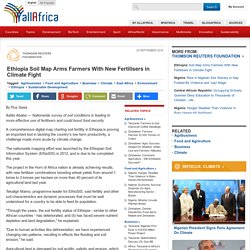
The nationwide mapping effort was launched by the Ethiopian Soil Information System (EthioSIS) in 2012, and is due to be completed this year. The project in the Horn of Africa nation is already achieving results, with new fertiliser combinations boosting wheat yields from around 1 tonne to 3 tonnes per hectare on more than 40 percent of its agricultural land last year. Ethiopia Joins Africa Rice, Pledges Commitment. Adungna pledged, on behalf of his government, Ethiopia’s commitment to increasing rice production in Africa.
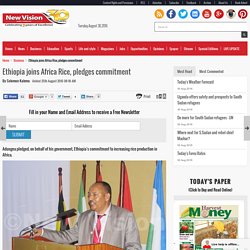
PIC:Adungna Wakjira, Deputy Director General of the Ethiopian Institute of Agricultural Research (EIAR) As resolved by the African Council of Ministers of Agriculture in Kampala on Tuesday, Ethiopia is now a member of Africa Rice, the continental association that promotes the crop’s local production. Ethiopia's to Double Livestock Production. Ethiopian bamboo: The new green gold of Africa? Two-thirds of the bamboo in Africa is situated in the upwardly-mobile state, and it is hoped that "green gold" can power growth.

"The farmer who has bamboo is rich, but he doesn't know it," says Adane Berhe, CEO Adal Industrial PLC, which is helping to build the new industry. Berhe has travelled to China, the global hub of the bamboo trade, to acquire modern manufacturing equipment. This has allowed his business to scale up from producing toothpicks to flooring and curtains. China is also beginning to invest in Ethiopia. The International Network for Bamboo and Rattan (INBAR) has now established an office in Addis-Ababa. "China has the technology, the capital, and the international market," says Fu Jinhe, East Africa Regional Coordinator for INBAR. INBAR estimates that the global market for bamboo is worth $60 billion and rising, a lucrative prospect for Ethiopian businesses, and potentially a major boost for the wider economy. The plant is also extremely versatile. Ethiopia: Milk Fortification, Powdered Milk Supply in Ethiopia.
AnalysisBy Abebe H.l Asia will remain the main market for dairy products, accounting for some 55 percent of world imports, followed by Africa, with 15 percent.
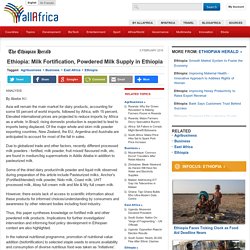
Elevated international prices are projected to reduce imports by Africa as a whole. In Brazil, rising domestic production is expected to lead to imports being displaced. Of the major whole and skim milk powder exporting countries, New Zealand, the EU, Argentina and Australia are anticipated to account for most of the fall in sales. Ethiopia: Equity Firm, Local Industry Partnership in Dairy. By Dawit Endeshaw With Kenyan expertise in the mix, SGI's investment will triple milk production and jobs Schulze Global Investments (SGI) has invested three to seven million dollars in a local milk processing company, MB Plc, for a 45pc share of the company.
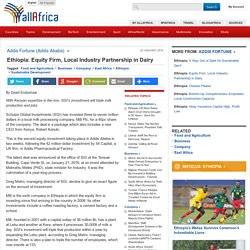
The deal is a package which also includes a new CEO from Kenya, Robert Kariuki. This is the second equity investment taking place in Addis Abeba in two weeks, following the 42 million dollar investment by 54 Capital, a UK firm, in Addis Pharmaceutical Factory. The latest deal was announced at the office of SGI at the Tensae Building, Cape Verde St, on January 21, 2016, at an event attended by Mebrahtu Meles (PhD), state minister for Industry. Greg Metro, managing director of SGI, decline to give an exact figure on the amount of investment. MB is the sixth company in Ethiopia in which the equity firm is investing since first arriving in the country in 2008. "It all depends on the feeding system; you get what you give," he said. 'Modern day Mendel' Modernizing Sesame Seed Production - The Media Line.
An accidental discovery may soon change the agricultural production of sesame seeds on a global scale.

When Israeli scientist Zvi Peleg was in Ethiopia on a research trip in 2008, he stumbled upon a plant he had never seen before, and had to know more. “It is not a crop grown in Israel and we never saw it before,” Peleg told The Media Line. The fact that the sesame plant is not native to Israel is quite a surprise considering it’s a staple food here. It can be found on everything from hamburger buns to pizza crust and is the essential ingredient in traditional foods like tahini and the sweet halva dessert. “I saw the sesame plants and it looked very exciting,” Peleg continued.” Peleg, a senior lecturer at Hebrew University’s Robert H. “We’re developing a biotechnology approach that enables us to improve the breeding process for faster breeding so that we can process a lot more plants at a better selection,” he clarified. “Dr. Peleg is expected to face some obstacles. Africa's Largest Gene Bank Helping to Bolster Biodiversity, Food Security: UNDP, GEF.
Addis Ababa July 15/2015 UNDP Administrator Helen Clark and Global Environment Facilities (GEF) Chief Executive Officer, Naoko Ishii, today visited Africa's largest gene bank.
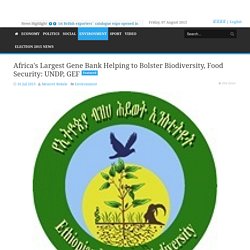
The gene bank is hosted by the Ethiopia Biodiversity Institute (EBI), and is among initiatives supported by UNDP and the GEF worldwide that exemplify how environmental finance can play a critical role in advancing sustainable development. ''We need to make smart decisions and leverage environmental finance to catalyze and deliver multiple economic, social and environmental benefits. Investing in the wellbeing of our planet and halting climate change should not be seen as a ‘cost’, but as a worthwhile investment, '' Helen Clark on the occasion said. “The needs for development will always outstrip the resources available, so we have to find the opportunities to catalyze change and snowball into impacts far in the future,” Dr Naoko Ishii said.
Ethiopia: Teff - Ethiopia's Tiny Secret Going Global. Photo: A.
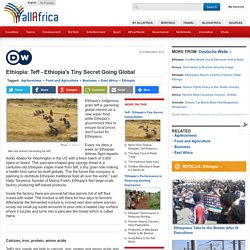
Davey Men and women harvesting the teff. Ethiopian farmers are getting 60% more of the value. Ermias Eshetu Chief executive, Ethiopia Commodity Exchange.
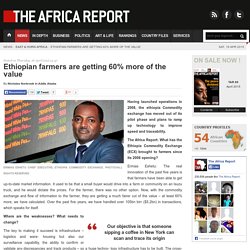
Photo©All Rights Reserved Having launched operations in 2008, the ethiopia Commodity exchange has moved out of its pilot phase and plans to ramp up technology to improve speed and traceability. Private food safety laboratory in Ethiopia aims to improve the country's agroprocessing industry. Ethiopian Agricultural Transformation Agency Creates a Hotline to Help Smallholder Farmers Nationwide. A new information hotline is giving smallholder farmers across Ethiopia access to best practice agronomic advice revolutionizing traditional agricultural extension.
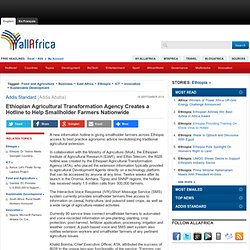
In collaboration with the Ministry of Agriculture (MoA), the Ethiopian Institute of Agricultural Research (EIAR), and Ethio Telecom, the 8028 hotline was created by the Ethiopian Agricultural Transformation Agency (ATA), who placed the extension information typically provided to agricultural Development Agents directly on a technology platform that can be accessed by anyone at any time.
Twelve weeks after its launch in the Oromia, Amhara, Tigray and SNNP regions, the hotline has received nearly 1.5 million calls from 300,000 farmers. The Interactive Voice Response (IVR)/Short Message Service (SMS) system currently provides smallholder farmers free access to information on cereal, horticulture, and pulse/oil seed crops, as well as a wide range of agriculture-related activities.
Irrigation projects in Ethiopia. Agro Investment in Ethiopia. Invest Here - Ethiopia @ AllComTV.com. Coverting Ethiopian Desert into Hyper-Productive Land. Ethiopias abundant farming investments leave many still hungry. Africa's First Commodity Exchange Revolutionized Ethiopia's Economy. Ethiopia Commodity Exchange AFRICANGLOBE – While government leaders, NGOs and corporations devise strategies to churn out more food for future generations, Eleni Gabre-Madhin is taking a different approach.
Concerned by a 2002 famine in her home country of Ethiopia that followed bumper crops in 2000 and 2001, the Stanford-educated economist decided it was time to go beyond food production and take a hard look at distribution. The result? Africa’s first commodity exchange. As the founder and outgoing CEO of the EEthiopia Commodity Exchange (CX), Gabre-Madhin established a reliable interface for buyers and sellers to meet – an idea that has inspired other African countries to follow suit.
Ethiopia determined to repeat its floriculture business miracle with fruits and vegetables. Summit to introduce low hanging sector opportunities for local and foreign investors in Ethiopia. In Ethiopia, a Saudi company leases land to grow and export rice. Gambella in western Ethiopia is one of the most fertile places in the mostly drought- and famine-stricken Eastern Africa country, with thick forests, scorching heat and abundant rains.
Saudi Star Offers Jobs to Overcome Criticism of Ethiopia Project. Saudi Star Agricultural Development Plc, owned by Saudi billionaire Mohamed al-Amoudi, said it plans to overcome local opposition to its Ethiopian rice project by offering jobs and training, a month after five people working on it were shot dead. Criticism by residents may subside when the 10,000-hectare (24,711-acre) plot is developed and 5,000 jobs are created on the farm in the southwestern Gambella region in about two years, Saudi Star Chief Executive Officer Fikru Desalegn said in an interview yesterday in Addis Ababa, Ethiopia’s capital. Ethiopia is leasing 4 million hectares of land to foreign investors in regions including Gambella as part of a commercial- farming drive. Yara Considers Heavy Investment in Ethiopia.
At the same time that Ethiopian authorities are using mineral fertiliser as political coercion tactics, Yara has applied to Ethiopian authorities for a license for mining operations and a factory worth billions. Yara and Jørgen Ole Haslestad, the President and Chief Executive Officer, consider starting mining operations and production of mineral fertiliser in Afar in Ethiopia. (Photo: Yara.) In September 2011 The Future in Our Hands wrote about how the Ethiopian authorities’ agricultural programme is being used in a political power play. Families that do not support the regime are punished by being refused access to mineral fertiliser.